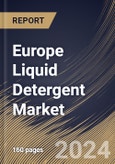This detergent is suitable for cleaning various household surfaces, including countertops, floors, tiles, and bathroom fixtures. It effectively cuts through grease, grime, and dirt, leaving surfaces clean and shiny. Some detergents are formulated specifically for dishwashing, offering powerful grease-cutting properties to remove food residues and grease from dishes, utensils, and cookware.
Additionally, this detergent can be used for cleaning vehicles, including cars, trucks, motorcycles, and bicycles. Diluted in water, it helps remove dirt, road grime, and contaminants from vehicle surfaces, leaving them clean and shiny. This detergent is versatile enough for general cleaning tasks around the house, such as mopping floors, wiping furniture, and cleaning appliances. Its ability to dissolve in water makes it suitable for various cleaning applications.
As disposable income levels rise across Europe, consumers have more financial flexibility for discretionary spending. This often leads to increased expenditures on lifestyle-enhancing products, including these detergents. Eurostat reported that in 2022, the European Union's gross household-adjusted disposable income reached €11,586 billion, constituting approximately 73.3% of the gross domestic product (GDP). Among the EU member states, France contributed the largest share to the gross household-adjusted disposable income, accounting for 18.3%, followed by Italy with 13.0%. Therefore, increasing disposable income in the region is driving the growth of the market.
The Germany market dominated the Europe Liquid Detergent Market, By Country in 2022, and would continue to be a dominant market till 2030; thereby, achieving a market value of $3,199.8 million by 2030. The UK market is exhibiting a CAGR of 4.3% during (2023 - 2030). Additionally, The France market would experience a CAGR of 6.1% during (2023 - 2030).
Based on Nature, the market is segmented into Conventional, and Organic. Based on Application, the market is segmented into Laundry, and Dish Washing. Based on End-use, the market is segmented into Residential, and Commercial. Based on Sales Channel, the market is segmented into Supermarket & Hypermarket, Departmental & Convenience Stores, Online Sales Channels, and Others. Based on countries, the market is segmented into Germany, UK, France, Russia, Spain, Italy, and Rest of Europe.
List of Key Companies Profiled
- The Procter and Gamble Company
- Church & Dwight Co., Inc.
- Henkel AG & Company, KGaA
- Unilever PLC
- S.C. Johnson & Son, Inc.
- Kao Corporation
- Jyothy Laboratories Ltd.
- Godrej Consumer Products Ltd. (Godrej Group)
- Amway Corporation
- Lion Corporation
Market Report Segmentation
By Nature (Volume, Kilo Tonnes, USD Billion, 2019-2030)- Conventional
- Organic
- Laundry
- Dish Washing
- Residential
- Commercial
- Supermarket & Hypermarket
- Departmental & Convenience Stores
- Online Sales Channels
- Others
- Germany
- UK
- France
- Russia
- Spain
- Italy
- Rest of Europe
Table of Contents
Companies Mentioned
- The Procter and Gamble Company
- Church & Dwight Co., Inc.
- Henkel AG & Company, KGaA
- Unilever PLC
- S. C. Johnson & Son, Inc.
- Kao Corporation
- Jyothy Laboratories Ltd.
- Godrej Consumer Products Ltd. (Godrej Group)
- Amway Corporation
- Lion Corporation








